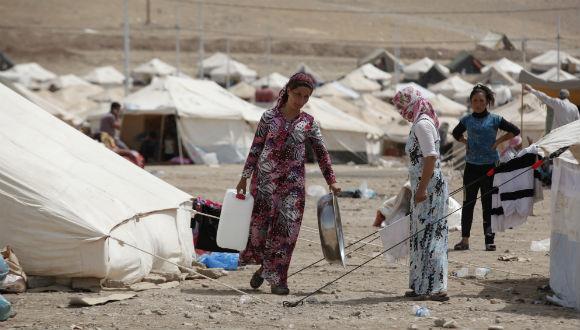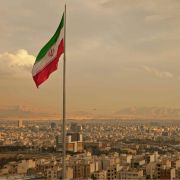As Syria Hemorrhages
 The heart-breaking image of a three-year old lifeless Syrian boy lying face down on a Turkish shoreline, and the moving scenes of many tens of thousands of desperate refugees struggling to reach a safe haven in Europe have gone viral throughout the Middle East and the West, and driven home a stark fact: After 4½ years of brutal warfare, Syria is hemorrhaging.
The heart-breaking image of a three-year old lifeless Syrian boy lying face down on a Turkish shoreline, and the moving scenes of many tens of thousands of desperate refugees struggling to reach a safe haven in Europe have gone viral throughout the Middle East and the West, and driven home a stark fact: After 4½ years of brutal warfare, Syria is hemorrhaging.
The humanitarian responses, or lack thereof, of neighboring Arab states, particularly the wealthy Gulf Arab countries, and of Turkey, as well, have drawn the attention of commentators and analysts and blame is being apportioned accordingly. Some analysts in the region have gone even further in their critiques, viewing the entire horrific episode as a reflection of the bankruptcy of Arab and Muslim societies.
The figures are stark: an estimated 220,000 fatalities and countless more maimed and injured and approximately 50 percent of Syria’s prewar population of 22 million people displaced from their homes, four million of which are now outside the country. The bulk of these four million have found tenuous shelter in three neighboring countries: Jordan, Lebanon and Turkey.
Lebanon hosts the largest number of Syrian refugees, per capita ‒ 1.15 million, equating to 232 per 1,000 inhabitants, according to official figures; Jordan ranked second after Lebanon, with the ratio of Syrian refugees standing at 87 per 1,000 per capita, amounting to 1.4 million persons; Turkey, the jumping off point to Europe for most of the refugees, hosts more than two million, 90 percent of whom are fending for themselves outside of refugee camps, with 330,000 in Istanbul alone, more than the total amount of Syrian refugees in all of Europe.
Inevitably, they place great strains on the capacities of the host states to provide basic services – housing, medical care, jobs, welfare, etc., resulting in large scale poverty and misery. In Turkey, tensions between Syrian refugees and local Turks have often taken on ethnic-sectarian colorings.
As some in Europe, particularly Germany, responded with humane gestures, many questions were raised by Arab and Turkish commentators and in the social media regarding the phenomenon. Why weren’t the wealthy Gulf Arab states rushing to offer their Arab and Muslim brethren succor and shelter? Why did the migrants prefer to risk their lives to reach a culturally and religiously alien Europe and not seek shelter in more familiar environs?
The oil and gas-rich Gulf Arabs have always been the targets of criticism and jealousy from other Arabs, who traditionally tended to view them as uncivilized desert Bedouin who just happened to have lucked out, and were now lording it over the rest of them, while not sufficiently sharing their fabulous wealth. This was particularly evidenced in 1990 when Saddam Hussein’s invasion of Kuwait generated a visceral feeling among many of the urban Arab masses that the Kuwaitis had received what was coming to them.
Gulf leaders and some media commentators hastened to rebuff the latest criticism, marshaling a variety of statistics, some credible, others less so. The Saudi press agency reported that King Salman had chaired a cabinet session designed to combat the “false and misleading” accusations of inaction, and claimed that Saudi Arabia had received 2.5 million persons since the beginning of the war (the actual number is somewhere between 100,000-250,000). Saudi officials also stated that they have provided $700 million to support refugee camps in Jordan and Lebanon. Similarly, the UAE stated that it was hosting 250,000 Syrians.
Why was there no mass flow of refugees to the Gulf? One reason is simply geographic; another is the Gulf states’ strict regulatory regime imposed on the influx of foreign labor (they are not signatories of the 1951 Geneva Convention on refugees, which would obligate them to confer certain rights on the refugees). Their wariness was also due to a concern that a large influx of Syrian (and Iraqi) Arab refugees, who are more culturally akin to the Gulf Arabs than the south Asians that are present there in large numbers, could end up destabilizing their kingdoms.
And, at bottom, Europe, despite its economic limitations and growing xenophobic anti-immigrant and anti-Muslim tendencies in some sectors, offers more hope to desperate refugees from Syria, Iraq and elsewhere than the Arab-Muslim milieu. As a number of Arab journalists noted, life in Europe held out the prospect of receiving citizenship, equality and justice under the law, all of which is absent in their countries of origin.
The author is a Principal Research Fellow at the Moshe Dayan Center for Middle Eastern and African Studies, Tel Aviv University






